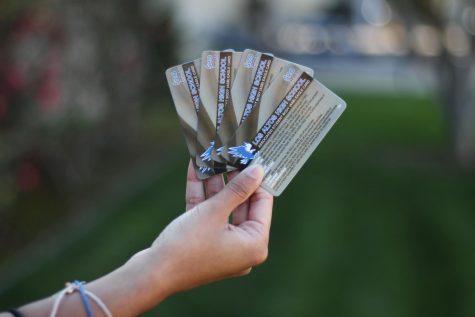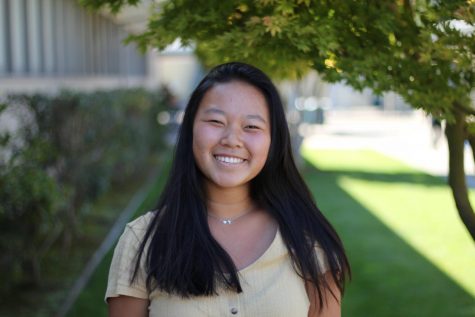ASB and SCL grading policies violate California Education Code
November 8, 2019
ASB’s and SCL’s (Associated Student Body and Student Community Leadership) grading policies, which require students to sell merchandise and tickets in exchange for their grade, violate the California state Educational Code, Santa Clara County education policies, and Mountain View-Los Altos (MVLA) District policies.
With slight variation, ASB and SCL policies require that students sell a certain number of merchandise and tickets. If they are unable to meet this quota, their grades are negatively affected. To avoid this, some students end up paying for unsold goods themselves.
“For Eagle cards, we were given 10, and they’re each worth $20, so if we didn’t sell them, we had to pay for them, or else [the unsold tickets] show up as a zero in the grade book,” former SCL student senior Carolyn Yih said. “I had to pay $100 because I only sold five [Eagle cards], and that’s not pocket money.”

According to Joshua Brysk, Esq., a lawyer with experience in education law, “It is forbidden to require any type of payment for public school education. [The situation] could be interpreted as requiring payment in exchange for education, or even for a grade.” Specifically, Brysk was referring to California Education Code § 49011(b)(4):
“A school district or school shall not remove course credit or privileges related to educational activities, or otherwise discriminate against a pupil, because the pupil or the pupil’s parents or guardians did not or will not provide money or donations of goods or services to the school district or school.”
However, Los Altos Principal Wynne Satterwhite believes the grading policy about merchandise sales is legal. According to ASB adviser Suzanne Woolfolk, students are not supposed to buy back merchandise with their own money.
“The purpose is to get these [Eagle] cards out into the community, not to let the parents cut a check—their [checks] are not accepted [in ASB],” Woolfolk said.
But students can just as easily use smaller bills to pay rather than checks, as some do.
While SCL adviser Sarah Alvarado grades based primarily on effort, some students still feel pressure to buy back their tickets to ensure they receive credit in the gradebook. Furthermore, Alvarado allows students in SCL to pay for the unsold merchandise themselves, thinking they will sell them later. This, however, allows for even more potential violations of the law than in ASB.
“At no point would I ever advocate for, nor have I advocated that [students] pay for the cards themselves,” Alvarado said. “Some do, because with the end of the school year coming up, they have a lot more going on, but once school’s done, they will be able to sell [the Eagle cards]. I’ve had parents and students give me a check, but in no way is it the expectation.”
According to another SCL student, however, there is a tacit expectation that students pay back unsold goods, even if it isn’t Alvarado’s intention to create such an environment.
ASB and SCL advisors have never questioned how merchandise sales are graded. When asked about the history of these policies, both Woolfolk and Alvarado said that they had been in place before they took over their respective positions, and the classes have just followed them. When asked about any Education Code violations such an issue might bring up, the response was the same.
While some ASB and SCL students can pay for what they don’t sell fairly easily, some low-income students don’t have that luxury. This could prove to be a deterrent for such students to consider joining ASB or SCL in the first place, something that would counter the work put into diversifying student leadership.
Some teachers, in order to alleviate the financial stress on their students, have bought multiple Eagle cards from students so their grades won’t be impacted.
Both Alvarado and Woolfolk say that circumstances in which students actually pay back tickets are rare. ASB and SCL provide guidance to help their students sell, including in-class demonstrations, group selling activities, new students being paired with experienced students and deadline extensions. Advisers also mention how they grade on a case-by-case basis, taking effort into account to make the policy fairer. Some students further believe that if they put in enough effort, selling everything shouldn’t be an issue at all.
Yet some students still find that it’s not that simple. One issue students brought up is that there is simply not enough interest in some of the events, such as Trivia Night.
“Nobody wants to go to Trivia Night, so you’re trying to sell something that takes time out of their weekday,” an anonymous former SCL student said.
Similarly, when selling items like Eagle cards to members of the community, home location can impact sales. Most of the discounts provided by Eagle cards are located in Los Altos, so students who live outside of Los Altos struggle to sell around their neighborhood, a common strategy students use to sell their Eagle cards.
“Since most of the stores are only around Los Altos, there are only so many Los Altos students and Los Altos parents that want to buy them,” Carolyn said.
Moreover, competition to sell to such a small demographic of interested students is fierce, and even then, not all students start on a level playing field. According to an anonymous ASB student, selling to other students often becomes a popularity contest.
As such, the fact remains that student reports are inconsistent with what Alvarado and Woolfolk say—students are buying back what they can’t sell, and it isn’t all that uncommon.
Students and advisers do agree, though, that the money that ASB and SCL raise is necessary. According to Woolfolk, most of the money goes to funding programs such as sports, bailing out underfunded clubs, and providing scholarships for students for activities like prom. Without ASB’s funding, many athletic teams and clubs would be unable to function. ASB classes in most other schools don’t have to fund such programs, which makes Los Altos’s ASB an anomaly. SCL’s smaller budget is used for student wellness during wellness weeks, ice cream socials and other social events, all of which are also funded by Eagle cards. Accordingly, many are concerned that if the policy is retracted, many programs will cease to exist.
If ASB and SCL were to change their policies, then alternate methods of funding would need to be implemented to continue running many of these programs. That process has already begun.
“What we are looking into is if there are other ways to fundraise to achieve the goals that ASB and SCL and other groups on campus are trying to achieve,” Satterwhite said. “The administration is working with the district to better define fundraising policies.”





